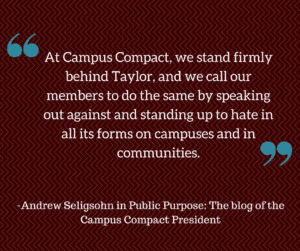Following Taylor’s Lead: Courageous Leadership in Standing Up to Hate
By Campus Compact President Andrew Seligsohn
Taylor Dumpson, a 2017 Campus Compact Newman Civic Fellow, began her term as president of the American University student government this spring. When she did, she became the first African American woman to hold that position. As Taylor began her work on behalf of the students who had elected her, she was confronted, on the very first day of her term, with a racist backlash, as an unidentified person placed bananas in nooses on trees around the campus. The bananas were inscribed with the initials of Taylor’s sorority, a historically African-American association of women. When Taylor spoke out in response to this hateful act, telling her fellow students that she would not be intimidated, a neo-Nazi called for white supremacists to join him in attacking Taylor on social media.
Everything about these attacks on Taylor is horrifying. At a personal level, I was most outraged by the racists’ use of the symbolism of lynching. All Americans should inform themselves about the history of lynching if they are not aware of it already. From the late 19th century through the late 20th century, more than 4000 Americans—the vast majority African Americans—were lynched as part of an ongoing effort to terrorize communities as means of upholding systemic racism. Lynching is a calculated use of violence to intimidate and silence in the service of white supremacy. Invoking lynching is anathema to democracy and to higher education.
The hate crimes directed at Taylor are unfortunately part of a much larger landscape of increasing hate crimes and bias incidents in the United States since the 2016 presidential election. In the midst of this climate, we are committing ourselves to redoubling our efforts to support campuses in combatting hate and systemic injustice–we must lean into discomfort by engaging with these often uncomfortable topics in order to move toward to more inclusive communities on a local, national, and international levels. We recognize that it is not enough to be non-racist in the current climate. Each of us has an obligation to be anti-racist—actively taking steps to eliminate the barriers to full and equal participation.
A founding principle that unites the Campus Compact network, including the exemplary students involved in our Newman Civic Fellowship, is the core belief that our democracy is worth fighting for. Taylor’s courageous leadership and commitment to serving her fellow students in the face of hateful personal attacks serves as an example for all of us who work to serve our communities and the public good. At Campus Compact, we stand firmly behind Taylor, and we call our members to do the same by speaking out against and standing up to hate in all its forms on campuses and in communities.


